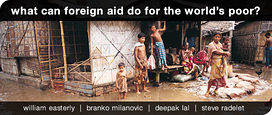Lead Essay
It is a tragedy that billions suffer from extreme poverty. The second tragedy of the world’s poor, William Easterly maintains in this month’s lead essay, is that trillions spent on foreign aid have done so little to help. Aid efforts so rarely succeed because they so often lack feedback and accountability. The way forward, Easterly argues, is “truly independent scientific evaluation of specific aid efforts … continuous evaluation of particular interventions from which agencies can learn.”
Response Essays
In his spirited reply to this month’s lead essay the World Bank’s Branko Milanovic claims that William Easterly’s argument is misleading. Easterly, Milanovic argues, is not clear about the definition of “aid,” and he both underestimates how much governments can do to help the poor and overestimates the likely effectiveness of his proposed new “grandiose bureaucracy” to assess aid effectiveness. Easterly, Milanovic writes, “provides an argument for those who have long argued that the best policy is to do nothing and ignore the poor world.”
In his reply essay, Deepak Lal, the James S. Coleman Professor of International Development Studies at UCLA, argues that like almost all aid efforts, Easterly’s proposed evaluation initiative is likely to fail. “Short of direct or indirect imperialism,” Lal argues, “there seems to be little hope of overcoming the domestic political obstacles to the efficient utilization of foreign aid.” Easterly’s proposal is just more fodder for the “Lords of Poverty,” the middle class professionals who derive a good living from the international business of alleviating world poverty.
The Center for Global Development’s Steve Radelet argues against Easterly that, in fact, “aid amounts have been modest” and that the evidence shows that aid is often effective. Without successful health interventions, “millions of these people would be dead,” Radelet writes. Furthermore, he argues, aid does promote economic growth. “Here is the dirty little secret: most of the published research over the past decade has shown a modest positive relationship between aid and growth.”

